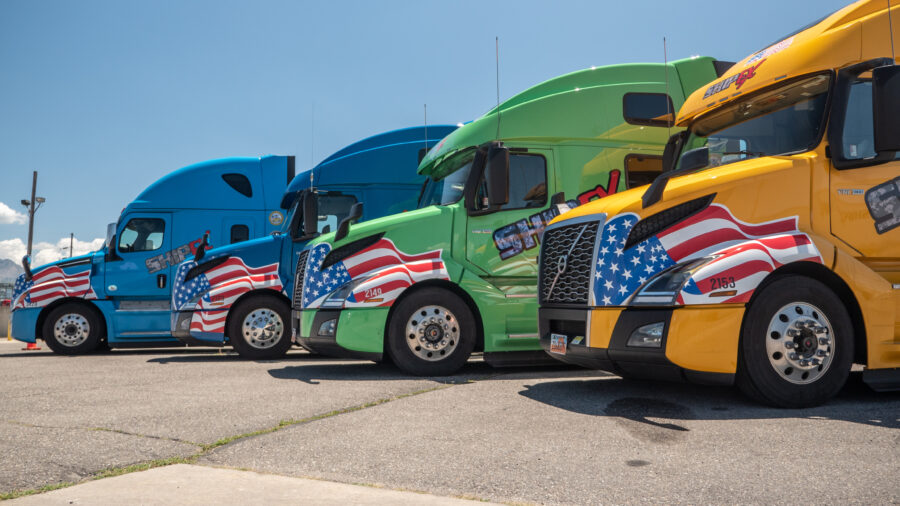Getting a trucking career started with getting a CDL (Commercial Driver’s License) which is the first step in proving you can drive big rigs safely and responsibly. It’s a process of several steps that includes meeting eligibility requirements, understanding the different CDL classes, and passing both written and practical tests. This guide will break down each step so you’re ready for the road ahead.
Choosing the right truck driving school is a big decision. A good school will prepare you for the CDL exam and give you the skills for a successful trucking career. When looking at schools consider the experience of the instructors, the comprehensiveness of the training, and the amount of hands-on driving time. A good truck driving school will have a balanced curriculum that covers the theory for the written exam and the skills for the road test so you have a solid foundation for your truck driving career.

How to Get Your CDL:
CDL Eligibility Requirements
Before you start the process of getting your CDL you need to know if you meet the eligibility requirements for your state. Most states have specific requirements that applicants must meet before applying for a CDL. These requirements are:
- Age: In most states, you must be at least 18 years old to apply for a CDL. But if you plan to drive interstate you must be at least 21 years old.
- Residency: Many states require you to be a resident of the state you’re applying for a CDL in for at least one year. This residency requirement means you have a connection to the state.
Knowing these eligibility requirements is the first step in planning your commercial driver career and can save you CDL license fees from unsuccessful applications.
Getting a CDL Learner’s Permit
After you’ve confirmed your eligibility the next step is to get a CDL learner’s permit which allows you to practice driving a commercial vehicle under certain restrictions while you prepare for the CDL skills test. This process includes:
- Written Exam: You’ll need to pass a written exam to test your knowledge of traffic laws, road signs, and safety regulations. Passing this exam is crucial as it sets a solid foundation in the rules of the road and saves you from retake fees.
- Identity Verification: Routine identity verification is part of the application process including providing proof of your identity, residency, and Social Security number. Meeting these requirements prevents delays and additional CDL license fees.
Affordable CDL Training Options
Now that you have your learner’s permit it’s time to look at affordable CDL training options. There are several to choose from depending on your budget and preferences:
- CDL Schools: These schools offer intensive hands-on training that can help you get the skills you need to pass the CDL skills test. While these programs may cost more upfront they can save you time and money in the long run.
- Community College Programs: Some community colleges offer more affordable longer-term CDL training programs making them a good option for those on a budget.
- Employer-Sponsored Training: Many trucking companies offer training programs and may even give you a job guarantee upon completion. This is a cost-effective option for those looking for immediate employment.
Regardless of the training path you choose, make sure to complete Entry-Level Driver Training (ELDT) if you want to get a Class A CDL. ELDT ensures comprehensive training and saves you from CDL license fees from inadequate preparation.
CDL License Fees and Costs
As you go through your training program you’ll encounter CDL license fees and costs:
- Written Test Fees: These fees are for the written exams you need to pass, covering topics like air brake systems and hazardous materials.
- Skills Test Fees: Fees for the practical CDL skills test to test your driving skills, including precision parking and tight space navigation.
- Medical Examination Fees: Budget for the Department of Transportation (DOT) medical examination to ensure you’re physically fit for the demands of a commercial driver.
You need to plan for these expenses and factor them into your budget. Research local pricing and discounts or fee waivers to save on CDL license costs.
Cost and Financial Planning
When it comes to getting a Commercial Driver’s License (CDL) you need to know the costs involved. A CDL can cost anywhere from $3,000 to $7,000. These costs include a CDL training fee, CDL license fee, CDL license cost, permit and licensing fees, medical examinations, and equipment like textbooks and safety gear. Keep in mind the actual cost will vary depending on the type of CDL, your location, and the training program you choose. However, there are financial assistance options like scholarships, grants, and loans to help alleviate the cost for commercial drivers. And some trucking companies offer sign-on bonuses as incentives to help offset the CDL cost.
Employer-Sponsored Programs: Looking into employer-sponsored CDL school options can be a smart way to manage CDL license costs. These programs are often offered by trucking companies and have many benefits. They usually include job placement guarantees after training so you have a direct path to employment. In exchange for the training, you commit to working for the sponsoring company for a certain amount of time. This works for both parties, the trucking company gets a pool of trained drivers and you get the skills and experience without having to pay the full cost of getting a commercial driver’s license. If you want an efficient and cost-effective way to get your CDL then employer-sponsored programs are worth looking into.

Choosing the Right CDL School
When it comes to getting your Commercial Driver’s License (CDL) one of the first decisions you’ll face is choosing the right CDL school. Location plays a big part in this decision. To set yourself up for success consider the following:
- Convenience is Key: Choosing a CDL school near you can make all the difference in your training experience. Commuting to a school that’s close to you reduces travel time, saves you money, and allows you to focus more on your studies and practice. Look for schools within a reasonable distance from your home or current location.
- Relocation for Better Training Opportunities: In some cases relocating to a different area may be worth it if it means better training opportunities. Some areas have a higher demand for truck drivers which means more job openings and potentially higher pay. Is relocating an option for you and does it align with your career goals?
- Reputation: The reputation of a CDL school should be your top priority during your selection process. A school’s reputation can tell you a lot about the education and opportunities they can offer you.
- Research and Reviews: Take the time to research and read reviews about different CDL schools. Look for information on their success rates and job placement statistics. Schools that produce skilled, job-ready drivers are generally a good indicator of a good program.
Programs
Each CDL school has different programs so make sure you choose the one that aligns with your career goals. Not all careers in the trucking industry require the same qualifications so make sure you know which ones you need.
Think about your career in the trucking industry. Are you looking to do long haul, local delivery, or specialized niches like tanker or hazmat transportation? Choose a school that offers training for the CDL classes and endorsements that match your career goals.
Cost vs. Quality
Cost vs quality is a big concern for many aspiring truck drivers. While cost is important, remember your CDL training is an investment in your future.
Affordable Programs: Look for CDL schools that offer affordable programs, scholarships, or financial aid. But be wary of programs that are too cheap, they may compromise on the education and support.
Quality Training: Quality training is key to your success as a truck driver. Consider the curriculum, the experience of the instructors, and the hands-on training. Ultimately it’s worth investing in a program that sets you up for success.

Industry Insights and Tips
- Safety is number one in the trucking industry. As you start your trucking career make safety your top priority.
- Get to know the rules and regulations for commercial vehicles. Compliance is not only for your safety but also to stay in good standing with the authorities.
- Practice safe and defensive driving. Avoid distractions, maintain proper following distance, and stay alert on the road. Your safety and others depend on you.
- The trucking industry has many career opportunities. Explore the diversity within and consider specializing in areas that interest you and your skills. Trucking is not just long haul. You can do regional driving, local delivery, or even specialized niches like refrigerated transport or hazmat. Find your niche and master it.
Final Thoughts
Choosing the right CDL school is a big decision, so make sure you consider location, reputation, programs, and cost vs quality. As you start this journey make safety, explore the career opportunities, and commit to lifelong learning. The trucking industry is vast and with the right training and attitude, you can succeed.


